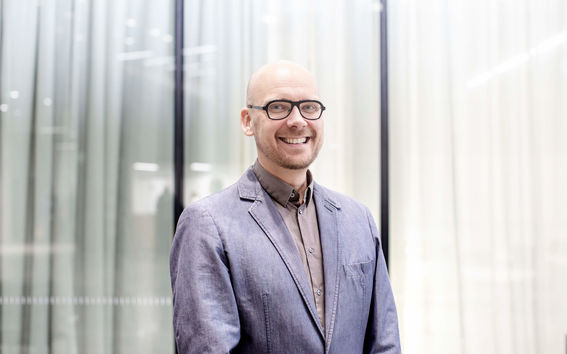Mika Järvinen turns slag and carbon dioxide into profitable business

Professor Mika Järvinen, what do you research and why?
Together with my group, I carry out research related to the circular economy and the use of bioenergy and waste in energy technology. In our research, we work closely with industry. One of my largest projects at the moment relates to the utilisation of the slag generated in steel production. We have developed the Slag2PCC process, which binds carbon dioxide to calcium that has been dissolved from steel slag using ammonium chloride (NH4Cl). This produces precipitated calcium carbonate (PCC). We therefore reduce the amount of slag and bind carbon dioxide, thus combining two bad things to make one useful one. At the same time, we also recycle calcium.
PCC is widely used as an industrial raw material. For example, one quarter of printer paper is calcium carbonate, and it is also needed in the manufacture of paints, plastics, cement and bricks. The resulting calcium carbonate powder can also be reused in steel production, eliminating the need to excavate so much limestone from nature. The process was granted its first patent in 2011, and the second application is now pending.
At the beginning of my career, I did science for science's sake, for the sheer joy of research. Now I think that this is not enough – now I'm constantly thinking about the big picture. How will my activities affect the environment and the use of natural resources? How will the results benefit the circular economy? In order to make the solutions available on a wider scale, the processes must be economically viable.
How did you become a researcher?
I did my master’s thesis in the world of industry. Even though the work was interesting and I enjoyed it, I realised that I wanted to go deeper than was possible in the rushed industrial environment. So when I collected my master’s degree, I already knew that I would become a researcher.
What have been the highlights of your career?
Completing my doctoral dissertation was certainly the first highlight. I was given the opportunity to do this with industrial funding, which moved me deeply.
The finest and most unforgettable moment was when the Caltech, one of the world's leading universities in the field of technology, awarded us the Resonate Award in 2015. The award was for the world's first pilot plant that was trialling out the Slag2PCC process, and I received the award at the Aspen Ideas Festival together with one of my researchers Arshe Said.
What is required from a researcher?
A researcher must have a thirst for knowledge. If someone says something is good because it has been done like that for 50 years, this statement should not simply be accepted – we need to know why it is good and how it could be done better. Researchers should also be persistent – able to struggle on and sometimes be banging their head against the wall, but without fear of failure. Also, they must be broadly interested in the world around them.
What do you expect from the future?
I wish that there were more hours in a day, because I also really like teaching and would like to have enough time both to teach and to engage in unhurried research.
I also expect that we will get the remaining challenges solved for the Slag2PCC process and make it a clearly profitable commercial option. It is already at the edge to being profitable. The price of the solvent used in the process has been one of the bottlenecks, because it has to be continuously added, and the price of steel slag also varies. In Finland the price of the slag is fairly expensive, but in Japan, for example, we would be paid to make use of it because there the landfill option is either non-existent or extremely expensive. Japan also has industries which produce the solvent chemical as a by-product, as well as industries which require the calcium carbonate that we produce. The slag produced by Japan could be used to make all the PCC they need – what an incredible opportunity!
Once the production price is sufficiently small, the product will become saleable – and the manufacturing technology will spread more rapidly. The world needs examples of truly functional circular economies, and we are pioneering such examples in our own field of research.
Mika Järvinen and Aalto’s other new tenured professors will speak about their research at the Installation Talks event on 30 October. The presentations are presented in non-technical language and are open to all. We hope to see you there! Further information is available here.
Read more news

A sustainable city is also age-friendly
Cities must involve older adults more strongly in the planning of the urban environment.
Renate Zhang’s journey in optimising the cost of creation
During the research program at Aalto University, Renate Zhang developed a cost-saving method that inspired her to pursue a doctoral degree.
Chinonyelum Igwe’s contribution to the frontier of medical AI
Chinonyelum Igwe pursued her dual passions for medicine and AI through the AScI International Summer Research Programme






